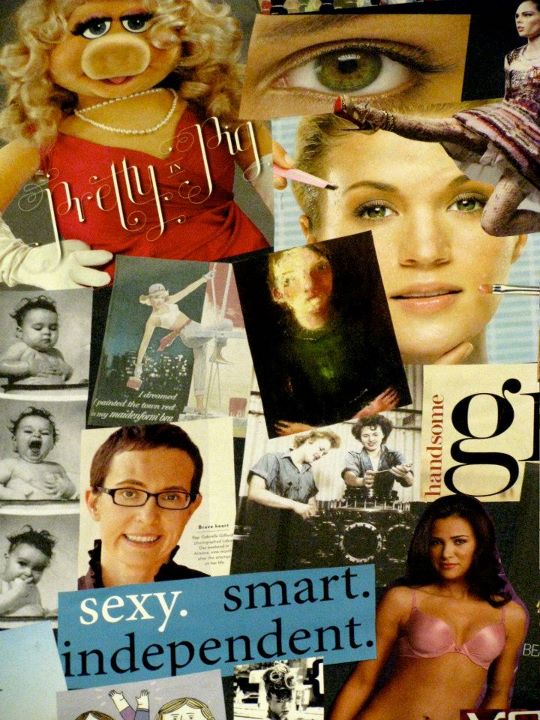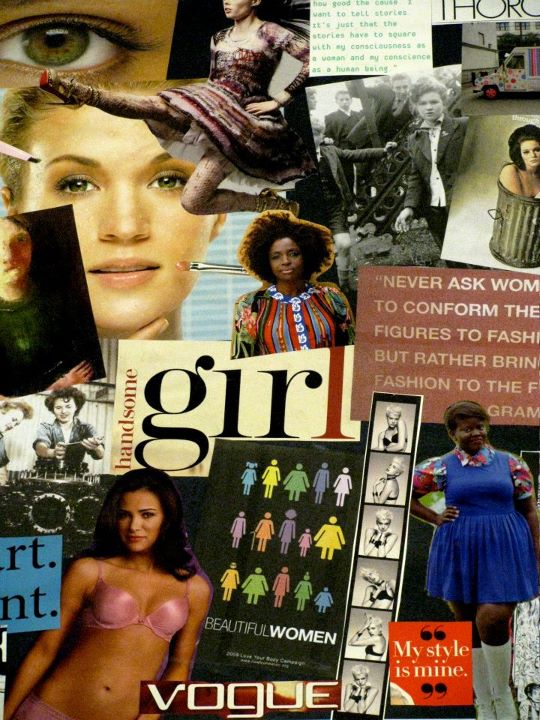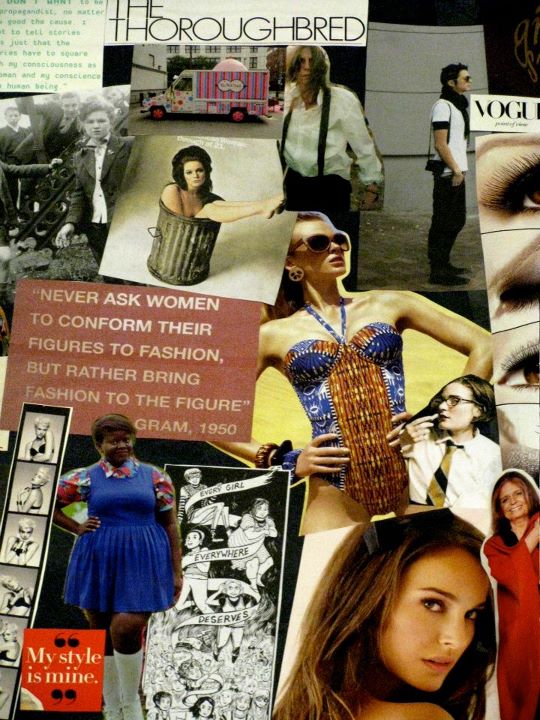Serendip is an independent site partnering with faculty at multiple colleges and universities around the world. Happy exploring!
essietee's blog

Evolution Revolution: An "Androgynous" Teach-In
essietee: Here’s a little know fact about me: I’m secretly in love with fashion and beauty. I love that a person can put on one outfit one day to reflect their mood or a certain personal ideal, then completely change that image whenever they please. I struggled with this fluidity of fashion as a teen living in an environment where you had to declare yourself as one thing or another (ie: jock, cheerleader, theatre nerd, etc.). It’s been a long road, but I’m finally comfortable wearing a dress and heels to go out on a Friday night, then switching into cargo shorts and an old t-shirt for Saturday evening. This proved to be a point that I thought about while taking and posing for these pictures: we started out with photographs of our individual faces and body parts, then moved on to clothing and makeup. I felt like a paper doll, grabbing different options from my closet; some of my clothes were things that I haven’t worn since my first year of college, while others are staples that I usually wear at least once a week. Though changing multiple times in a common space where anyone could view me (sorry, housekeeping!), I was very comfortable in my presence with my group-mates and with the clothing choices I made. They reflect who I am: a multifaceted incidivual who believes in expression of self and personal creativity. It’s like the lyrics for the song featured in our video, “Androgynous” by Joan Jett and the Blackhearts – “She's happy with the way she looks / She's happy with her gender.”

People Shufflin' Their Feet, People Sleepin' In Their Shoes
"Rockin' In The Free World" -Neil Young
I’ve spent a lot of time in the past week thinking about Judith Butler’s second Flexner Lecture on “Body Politics and the Politics of the Street,” specifically the notion of public versus private in relation to an individual’s right to appear. This separation of space has been ever-present in my undergraduate experiences, defining at times what I choose expose about myself, the activities in which I engage, and the individuals with whom I associate.
As a first-year student learning about sexuality, I spent a great deal of time reading and learning alone. My roommate, who was homophobic and transferred after our first year, made this task somewhat difficult: how could I become comfortable with myself while living with someone who was not comfortable with me? In private, I felt that I did not have the “right to appear,” while in the public eye of our campus I began to feel more comfortable. This ties back to our discussion last week on the right not to talk about certain experiences or personal components, just as we have the right to disclose such information at will. I am also reminded of the New York Times article we read earlier this semester regarding the therapist who encourages and aides his clients in the act of remaining within the closet.

Just To Clarify...

We're currently in class completing break-out groups that discuss Butler, Barad, Welch, and Humbach, specifically in regard to Eve Ensler's Huffington Post piece "Over It" (11 November 2011). In her writing, Ensler says that she is over "rape pages on Facebook" and "the thousands of people who signed those pages with their real names without shame." Three of my peers questioned what a rape page is - I'm attaching a link also printed by the Huffington Post entitled "Facebook Pulls A Few Controversial Rape Pages, But Many Remain" (9 November 2011) to clarify Ensler's words and to create more awareness for this specific issue.

Women Learn To Be Women, Men Learn To Be Men
"Letter to a John" - Ani DiFranco
In thinking about college activism in regard to Judith Butler’s lecture last night, I am struck by the thought of “appearing” on a college campus. While I would like to think that I’m having a typical college experience, the fact remains that I attend a women’s college and have little interaction with the male gender. Attending a domestic study away program last semester increased not only my academic knowledge but my social experiences as well, and I now call several of my male classmates from my time away from Bryn Mawr my closest friends.
Maintaining a friendship, as most of us know, takes a lot of work. So while most of my friends from my study-away experience do not go to Bryn Mawr or reside in the Philadelphia area, I regularly make efforts to remain in contact with them. Most recently I found myself braving a bizarre October snowstorm during a visit to Williams College in Williamstown, MA. While touring campus, I spotted a flier that would never, ever, not in a million years be seen on our campus. The flier reads as follows:
“Are you interested in men’s issues? Are you ‘man enough’ to talk about your feelings? Are you looking for different representations of masculinity? Then come meet, share your thoughts, and learn from other men who are interested in having conversations about the diverse experiences of male-identified people!”

Folded and Unfolded and Unfolding
One of the things I most enjoy about our class is the variance in perspective that comes from engaging with individuals who study in alternating areas. I, for example, am an English and Creative Writing student; other in our class may be studying Biology, History of Art, Psychology, or another area different than my own. In Rebecca Jordan-Young’s selection Brain Storm, she describes the term network and how it is used to “describe groups of connected people, and in science studies especially to describe how personal and professional connections among scientists shape the scientific knowledge they produce” (Jordan-Young 8). We may all be pursuing different areas of academia, but this class is our common link. By meeting each week to discuss Perspectives on Gender, we become a part of a network.
I was particularly intrigued by Jordan-Young’s perception of sex, gender, and sexuality as a three-ply yarn. They are all distinct strands and alone are functional; however, they may be wound together in the formation of a new entity that may be slightly “fuzzy around the edges.” This ties back into the idea of network, of individual people or thoughts that are connected through a commonality. But what do we call this newly formed three-strand yarn that is sex, gender, and sexuality? Do we even need to give it a name?

Just Something Interesting...
While not related to our current Act, I thought that this video was interesting and encompassed some of our ideas of being "at home" within one's body. It's a good reminder not to make preconceived judgements on others, as things may not be as they seem (I also just found it really amazing to watch and wanted to share). There's also a behind the scenes video which features some thoughts by Rico Genest, the gentleman featured in the video campaign. Enjoy!

I Don't Have To Be Hateful, I Can Just Say 'Bless Your Heart'
Miranda Lambert - "Only Prettier"
There are a few things that I always do when I go home for academic breaks: I spend time with my family, I catch up on sleep, and I swim laps at the local YMCA. Before coming to Bryn Mawr, I was a competitive swimmer for twelve years and swam in both club and Y leagues. When I was in high school, I brought a lot of my academic and pesonal stress to the pool, and my coach and I had to make an agreement: my nightly two-hour practices would be a time when I couldn't think about anything other than the set. The pool was my sanctuary, and I still view it as such.
Last week, I met my dad at the pool one afternoon to swim for a little while. After saying hello to my old coach, I hopped in and did a warmup. While stretching before completing my main set, another swimmer a few lanes over randomly called out to me. Now, when I swim, I'm in my own world and don't appreciate being interrupted; though a little bothered, I answered the gentleman's question about whether I was the new coach (I am not), whether I swam there on the swim team (I did), and where I went to school (Bryn Mawr). When I said the name of my school, I was greeted by a strange yet familiar expression: he had never heard of it. "It's a women's college outside of Philadelphia, one of the original Seven Sisters," I went on to explain, thinking that would be it.
"Oh, so you must be a man-hater," he responded. "You're anti-man, right?"






